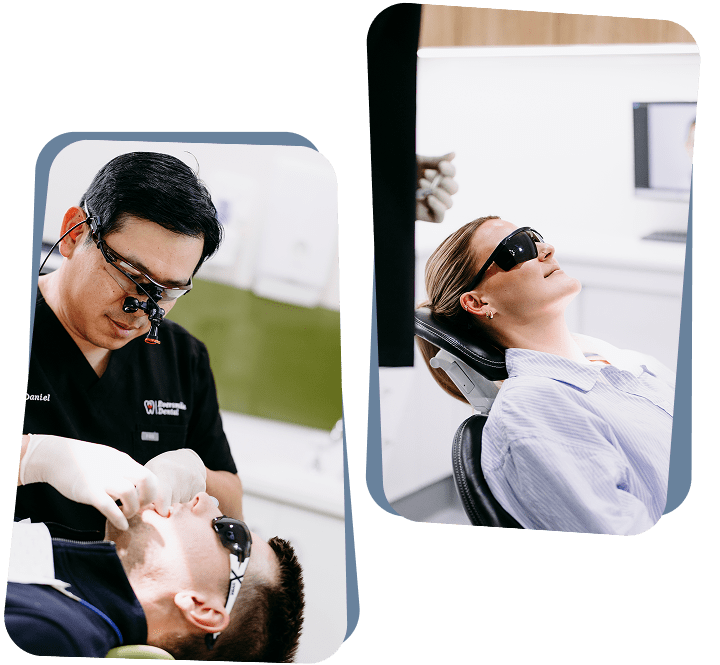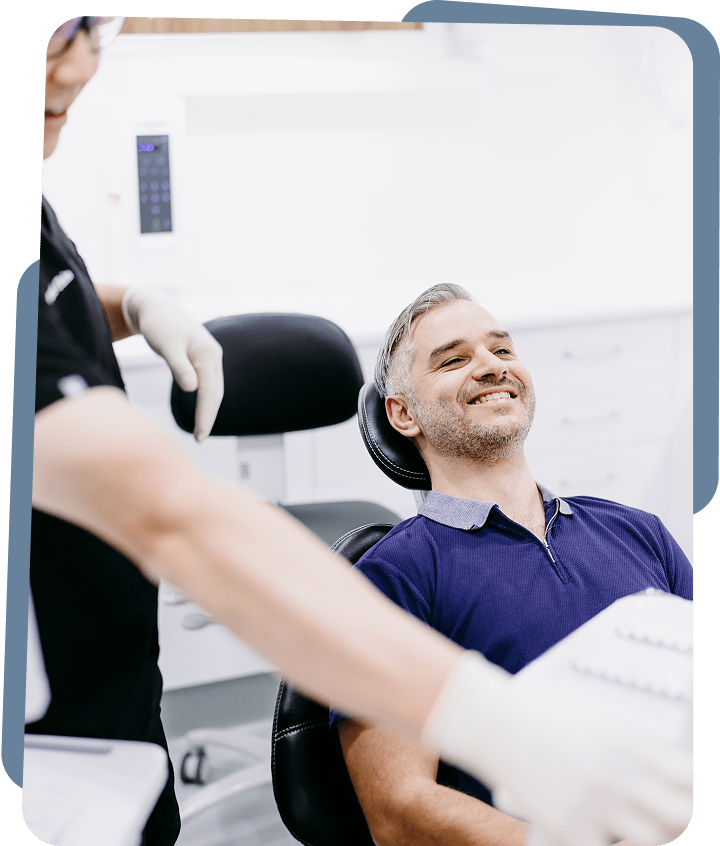Explore Options to Help Preserve Your Tooth
Root Canal Therapy in Bunbury with a Personalised Approach

What is Root Canal Therapy?
How Would You Know If You Need a Root Canal Treatment?
- Persistent Toothache
The pain often feels deep or throbbing and may come and go. It worsens when you bite or chew. Persistent discomfort in a single tooth may indicate inflammation or infection in the pulp tissue.
- Sensitivity to Temperature
Lingering discomfort after consuming hot or cold drinks may suggest that the nerve inside your tooth is inflamed or irritated. This type of pain often lasts longer than normal sensitivity and may need professional assessment.
- Swollen Gums
Swelling around a single tooth often appears with tenderness. You might notice a small pimple-like bump that releases fluid. This can indicate an infection inside the tooth that requires professional assessment and care.
- Tooth Darkening
A tooth that turns darker over time may suggest internal nerve damage, especially following trauma or deep decay. This colour change often occurs gradually and may indicate an underlying infection that requires professional evaluation.


The Real Benefits of Root Canal Treatment Explained
- Tooth Preservation
Root canal therapy removes infected pulp and may help preserve your natural tooth when clinically appropriate. Keeping your natural tooth can support normal chewing, help maintain bite alignment, and contribute to overall oral function.
- Pain Relief
By addressing infection and inflammation, root canal treatment may reduce pain in the affected tooth. Some patients may notice improvement after the procedure, although outcomes differ depending on the condition of the tooth.
- Restored Function
After treatment and final restoration placement, chewing and biting may feel more stable and functional. This can help distribute pressure more evenly and support nearby teeth, depending on your overall oral condition.
- Aesthetically Discreet
A restoration or custom crown is typically placed over the preserved tooth to restore its appearance and function. While these are designed to blend with your natural teeth, outcomes may differ based on individual anatomy, tooth colour, and shape.
Start with a Dental Consultation in Bunbury
Are you ready to prioritise your oral health? Book a consultation to discuss your oral health needs and treatment options.

Why Choose Eversmile Dental
-
- Proudly Bunbury Locals
- We don’t just work in Bunbury—we call it home. We raise our kids here, support local schools, and shop at the same weekend markets. We’re part of the fabric of this town, and we’re deeply connected with the people we serve. When you visit Eversmile Dental, you’ll be cared for by dentists who are part of the Bunbury community.
-
- Serving Since 2006
- Founded by Dr. Daniel Tham in 2006, Eversmile Dental has been part of Bunbury for nearly two decades, providing care for local families. We’re proud of our history and even more excited about where we’re heading as we continue caring for generations of local families.
-
- Dental Care for All Ages
- From a toddler’s first visit to helping grandparents maintain healthy gums, we tailor care for every age. We offer flexible appointment options and a supportive approach to make family visits easier. Our goal is to create a welcoming environment where dental care feels familiar and approachable.
-
- Personalised Care Plans for Your Needs
- You’re not just a number. At Eversmile Dental, we listen carefully, explain your options clearly, and work with you to create a plan that aligns with your goals. Whether you’re nervous, curious, or just want a second opinion, we’ll guide you with open communication and informed choices.
-
- Our Commitment to Professional Standards
- Honesty, integrity, and professional responsibility guide our care at Eversmile Dental. We clearly explain your treatment options and give you the opportunity to make informed choices without pressure. Our focus is on clear communication, professional advice, and delivering dental care in accordance with recognised standards.
-
- Modern Technology for Accuracy in Diagnosis and Treatment
- We’ve invested in modern dental technology, like 3D scanners, CBCT imaging, and EMS Airflow. Why? These tools assist with diagnosis and treatment planning in dental care.
Frequently Asked Questions
How does root canal therapy work?
Root canal therapy works by removing infected or damaged pulp from inside the tooth to prevent further issues. Your dentist accesses the pulp chamber through the crown of the tooth and carefully cleans it. After cleaning, the space is disinfected and sealed with a filling material to prevent reinfection. A restoration is often placed afterwards to protect the tooth and restore its function.
This treatment may help preserve the natural tooth and when clinically appropriate, reduce pain associated with deep decay or injury. It may also help relieve pain caused by deep decay or injury. The procedure is performed under local anaesthetic to help manage discomfort. Your dentist will discuss each step with you and address any questions you may have before starting the treatment.
Is a root canal treatment painful?
Many patients ask us, “Is a root canal treatment painful?” It’s a common concern rooted in old dental myths. Our priority is to keep you informed and provide you with the support you need. Here’s what you can expect before, during, and after a root canal treatment in Bunbury:
Before the Treatment:
- We take time to explain the process clearly, answer your questions, and assess your individual comfort needs.
- A CBCT (cone beam CT) scan may be used to capture detailed 3D images of your tooth and surrounding structures. This helps us plan the treatment carefully and accurately.
- A local anaesthetic is used to numb the area, which is intended to minimise discomfort during the procedure.
- If you’re feeling nervous, let us know—our team will discuss your concerns and explain each step to help you feel informed and prepared.
During the Treatment:
- Some patients describe the experience as similar to having a dental filling, although comfort can vary depending on the tooth and the complexity of the treatment.
- You may feel slight pressure or movement, but the anaesthetic helps manage pain during the procedure.
- We use current techniques and equipment that support treatment efficiency and patient comfort.
After the Treatment:
- Once the anaesthetic wears off, it’s normal to have some tenderness or mild discomfort for a few days.
- This discomfort is usually temporary and may be managed with over-the-counter pain relief. We’ll provide clear, easy-to-follow care instructions to support your recovery.
- Many individuals resume daily activities soon after treatment, although recovery varies.
We aim to clearly explain each step of your treatment and provide information to help you understand what to expect. If you have concerns about pain or the procedure, your dentist can discuss ways to help manage discomfort.
How long does a root canal treatment take?
Root canal treatment times can vary, but our primary focus is on providing quality care suited to your needs. Here’s a straightforward breakdown to help you feel prepared before your appointment at Eversmile Dental:
- Most root canal treatments are completed in one or two visits, depending on the tooth’s complexity. The number of visits may also vary depending on the severity of the tooth’s infection or inflammation.
- A front tooth usually takes about 60-90 minutes to address, depending on the complexity of the case. These teeth typically have a single root canal, making them easier and quicker to access than molars.
- A molar may take 90 minutes or more to address because it has multiple root canals. Its position at the back of the mouth can make it more difficult for the dentist to access during treatment.
- If the infection is severe or swelling is present, we may place medication inside the tooth to reduce inflammation. In this case, we’ll schedule a second appointment to complete the treatment once the tooth has settled.
- You’ll always have time to ask questions and receive clear information about what occurs during your treatment. We’ll keep you informed throughout your visit, explaining each stage clearly so you know what to expect.
Every case is different, so our Bunbury team will tailor your treatment plan to your specific dental needs. At our dental clinic in Bunbury, we aim to support your comfort and deliver care tailored to your dental condition.
Can I go to work after my root canal treatment?
Yes, you can return to work after endodontic treatment in Bunbury, but this may depend on your case. Consider the following when planning your recovery and return to work:
- Some patients feel ready to return to work the same day, especially after a straightforward root canal procedure.
- Mild discomfort or numbness may occur for a few hours following treatment and usually subsides on its own.
- If your job involves physical work, taking the rest of the day off may help support your recovery.
- Discuss your usual daily activities with your dentist during your appointment. Follow their advice to decide when to return to work.
It’s always a good idea to listen to your body and rest if needed after any dental procedure.
How much does a root canal treatment in Bunbury cost?
If you’re considering root canal treatment in Bunbury, it’s completely normal to have questions about the cost. We believe in transparency, so here’s what you can expect:
- As a general guide, the cost of root canal treatment depends on the number of canals involved. Pricing can also vary depending on the tooth’s condition and the type of restoration required:
- Estimated costs may include:
- 1-canal with filling: $980 – $1,975
- 2-canals with crown: $2,855 – $5,000
- 3-canals with filling: $1,820 – $4,640
- 4-canals with crown: $3,535 – $7,495
- Costs can vary depending on your region and your dental practitioner’s level of experience.
- At our dental clinic, we provide several payment options to help make your treatment more manageable:
- We’re preferred providers for HBF Member Plus, BUPA Members First, and Medibank Members’ Choice health funds. This may lower your out-of-pocket costs, depending on your health fund and the level of dental cover you have.
- Flexible payment options are available through SuperCare, which allows early access to superannuation for essential dental care. We also accept the Child Dental Benefits Schedule, the Department of Veterans’ Affairs (DVA), and the Country Patients Dental Subsidy Scheme (CPDSS).
- We accept Child Dental Benefits Schedule (CDBS), Department of Veterans’ Affairs (DVA), and Country Patients Dental Subsidy Scheme (CPDSS).
After your assessment, we’ll provide a detailed quote outlining expected costs. If you’re seeking root canal therapy in Bunbury, you can contact our team to learn more or book a consultation.
Do I need a crown after root canal therapy?
Whether a crown is needed after root canal therapy depends on the condition and location of your tooth. In some cases, a crown may be recommended to protect and strengthen the preserved tooth. After the procedure, the tooth may become brittle due to the removal of tissue during the cleaning and sealing process. A crown helps restore the tooth’s function, especially if it’s a back tooth used for chewing. Your dentist will assess your tooth and explain whether a crown is necessary based on its condition and location.
We’ll take the time to walk you through all your options before completing your treatment. Not every tooth needs a crown, but we’ll advise if it’s the most suitable option to avoid future issues. If a crown is recommended, we’ll adjust it to fit comfortably and match the look of your surrounding teeth. You’ll receive clear, personalised advice about your tooth and treatment options before any decision is made.
What are the alternatives to root canal therapy?
If a root canal isn’t suitable, your dentist may discuss other treatment options with you. These options will depend on the condition of your tooth and your overall dental health.
- Tooth Extraction:
A dentist may recommend removing the tooth if the infection or damage is too extensive to restore with treatment. - Dental Implants:
An implant can replace a missing tooth and may help maintain normal chewing and speaking function over time. - Dental Bridges:
A bridge uses surrounding teeth to support an artificial tooth, offering a stable option after tooth removal. - Partial Dentures:
Removable partial dentures can replace one or more missing teeth, which can help restore appearance and function.
The most suitable alternative will depend on your dental needs, so it’s recommended to discuss these options with your dentist.
Is it better to get root canal therapy or have the tooth extracted?
Root canal therapy may be suitable when the tooth can be preserved, depending on your dental assessment. Keeping your natural tooth may help maintain your bite and reduce the risk of nearby teeth shifting. Root canal treatment aims to address infection and preserve the natural structure of the tooth, depending on its condition. For some patients, preserving the tooth may support normal dental function and reduce the likelihood of further treatment.
However, there are times when extraction is the more appropriate option, based on the tooth’s condition or the severity of the infection. If the tooth is badly damaged or can’t be restored, we’ll explain your options clearly. We may also discuss replacement options, such as dental implants or bridges, after extraction. Our priority is to provide clear information that supports informed decisions about your oral health.
How long do the results of root canal therapy last?
If you’re considering root canal therapy, you might wonder how long the results will actually last. This is one of the most common questions we hear from patients. Here’s what you need to know:
- Long-term Relief is Common:
Root canal therapy may offer long-term results when supported by appropriate care, including good oral hygiene habits. In many cases, the preserved tooth may last for many years, though outcomes differ between individuals. - Restoration Matters:
After a root canal, the tooth often needs further restoration to protect it and restore function. Depending on how much tooth remains, your dentist may recommend a crown or a partial restoration option, such as an onlay. - Oral Hygiene Plays a Big Role:
Daily brushing, flossing, and regular checkups help maintain the health of the preserved tooth and surrounding areas. Poor hygiene can increase the risk of reinfection. - Results Can Vary Over Time:
While root canal treatments are effective, no dental treatment can offer results that will last the same for every patient. Sometimes retreatment may be needed years later if new issues arise or the infection recurs. - Follow-up Care is Key:
We’ll monitor your preserved tooth during routine visits to support its ongoing health and stability. Ongoing care is just as important as the treatment itself.
With consistent dental care and checkups, many patients retain their restored tooth for years. However, results and longevity vary depending on individual health and treatment response.
Can root canal therapy fail or get reinfected?
Yes, root canal therapy can sometimes fail if bacteria remain or return to the inside of the tooth after treatment. This may happen due to complex root shapes, hidden canals, or delayed placement of the final restoration. Reinfection can also occur if the tooth cracks or if the seal weakens over time. At our dental clinic in Bunbury, we discuss these risks with you before treatment.
We use dental imaging to assess the tooth and identify hidden canals or complex root structures. This helps us clean and seal the canals more precisely, assisting in the thorough cleaning and sealing of the canals. If discomfort returns, retreatment or further dental care may be required. Our Bunbury dental practitioners will explain each step clearly and provide balanced information about treatment options.
What happens if I don’t get a root canal treatment?
If you delay or avoid root canal treatment, the infection inside your tooth may continue to spread. This can lead to worsening pain, swelling, and possible damage to surrounding teeth or bones. In some cases, the tooth may die and eventually need to be removed. Dental infections, if not addressed, may spread, although serious complications are uncommon and depend on individual clinical assessment.
Delaying treatment can increase the chance of requiring more complex dental procedures as the infection progresses. Seeking timely care may help preserve the affected tooth and support oral health. We provide clear information about your dental treatment.
Are there any side effects or risks from root canal therapy?
Yes, as with any dental procedure, root canal therapy has risks and side effects. Being aware of risks can help you prepare for discussions about your treatment options. Here are a few things for patients to consider before starting endodontic treatment in Bunbury:
- Mild discomfort after treatment is common:
It’s normal to feel some tenderness or sensitivity after the procedure. This is a temporary condition that can be managed with over-the-counter pain relief. - Swelling or inflammation may occur:
Occasionally, the area around the preserved tooth can become swollen for a short time. This is part of the body’s natural healing response and usually subsides within a few days. - Infection can occasionally recur:
Although uncommon, it can develop if bacteria persist or re-enter the tooth after treatment, causing reinfection. If this happens, the tooth may need further treatment or retreatment. - The tooth may feel slightly different than before:
After a root canal treatment, your tooth may feel slightly different, especially if a crown is placed for protection. This is normal and doesn’t affect function. - Fracture risk increases if the tooth isn’t restored:
A tooth that has had a root canal treatment can become more brittle over time. That’s why placing a proper final restoration is often recommended to reduce the chance of fracture. - Allergic reactions are rare:
While uncommon, some patients may experience a reaction to the materials used during treatment. Please let us know if you have any known allergies so we can take the necessary precautions.
If you have questions, our Bunbury dental team will guide you and support you throughout your care. We prioritise your comfort and well-being.
Root canal therapy at Eversmile Dental is performed by registered dental practitioners:
Dr. Daniel Tham (DEN0001580557) | Dr. Howard Chin (DEN0001580816) | Dr. Karen Lim (DEN0001595836) | Dr. Dhagash Patel (DEN0002503715) | Dr. Tina Kamarudin (DEN0002779832) | Dr. Joanna Chiam (DEN0002897537).
All practitioners hold general registration with the Dental Board of Australia.
Individual outcomes and recovery vary. Consultation is required before treatment.
Various Payment Options Available
Book Your Appointment Online or Call Our Bunbury Dental Clinic
Book an appointment with our dentist in Bunbury to discuss your oral health needs. We provide tailored dental treatments and clear information to support informed decisions about your dental care.

